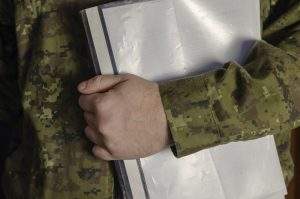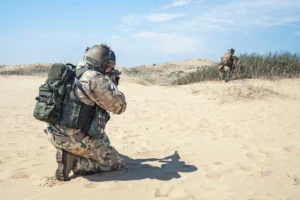James H. Binns, a Phoenix business executive who was the committee chairman until last month, said the new perspectives being sought by the VA will move the committee away from established science.
Until last month, the committee had been focused closely on research that showed links between health problems suffered by Gulf War veterans and their service in Kuwait and Iraq in 1990 and 1991, said Binns, who warned Congress that VA officials had been obscuring scientific evidence about Gulf War-related illness.
Binns and three other committee members’ terms expired on Sept. 30, and the VA declined to reappoint them. On Monday, the agency posted a notice seeking nominations for replacements on the 12-member Research Advisory Committee on Gulf War Veterans’ Illnesses.
“Widening our search for committee members to fill the upcoming vacancies will provide better diversity and enable us to bring in new, well-qualified members with fresh perspectives and input,” VA Secretary Bob McDonald said in a press release.
The press release does not explain why McDonald uses the term “upcoming vacancies” to describe vacancies created a week before the notice was issued.
Binns detailed his apprehension about the committee’s revolving membership in a four-page memo to members of Congress and veterans associations on his final day as chairman, Sept. 30.
“I leave the committee gravely concerned about the future of Gulf War illness research,” he wrote.
“From here on, neither the Secretary, nor Congress, veterans service organizations, veterans themselves or the public will know the whole truth behind VA Gulf War research. In the absence of an independent, knowledgeable body, staff will operate unchecked, and its campaign to revive 1990s fictions that Gulf War veterans have no special health problem will likely prevail.”
Members of the committee also made the point in person to McDonald during its meeting last month, Binns said in an interview with The Arizona Republic.
“I don’t know what more this committee could have said. We have been as blunt as you could possibly be, as specific as you could possibly be, right up until the very last day that we had a meeting,” said Binns, a Vietnam War veteran and medical-equipment industry executive.
“Yet I think it’s fair to say the new secretary, like other new secretaries, has essentially been at the mercy of what staff tells him,” he said.
Binns’ final memo has been circulated widely among veterans associations, said Rick Weidman, executive director of policy and government affairs for the Vietnam Veterans of America.
Veterans organizations are lobbying Congress to pass legislation that would have the Gulf War committee report directly to Congress rather than to the VA.
Weidman said it may seem like an extreme step, but VA administrators’ actions were out of line during the Gulf War committee’s last two-day meeting in Washington.
“It really was bizarre because you had the staff of the VA from the environmental-hazards and public-health section trying to drive their agenda. And their agenda is that there is no such thing as Gulf War illness; that it’s all psychosomatic,” he said.
The move to replace the Gulf War committee members came despite a request to McDonald by House Veterans’ Affairs Committee Chairman Jeff Miller, R-Fla., and four other members, including Rep. Ann Kirkpatrick, D-Ariz., to retain the Gulf War committee members. The lawmakers sent their request Aug. 20.
McDonald’s decision also followed an appeal by eight Gulf War committee members to McDonald to replace the outgoing members with scientists and veterans who are independent of VA administrators and who understand that Gulf War illnesses are not mental illnesses. The group, which included Binns, issued its letter Sept. 23.
VA administrators repeatedly have worked against Gulf War committee members to suppress the number of Gulf War veterans who would be eligible for treatment and compensation, Binns said in an interview.
Studies by the VA and various medical organizations indicate that as many as 250,000 Gulf War veterans suffer chronic, multisymptom illnesses that collectively are called Gulf War illness.
The symptoms include persistent headaches, joint and muscle pain, fatigue and sleep disorders, cognitive problems, gastrointestinal issues and skin abnormalities.
Binns and current and former Gulf War committee members point to a 2010 report by the Institute of Medicine of the National Academies stating that the ailments cannot be ascribed to known psychiatric disorders. It’s likely the ailments are the result of interplay between genetic and environmental factors, according to the report.
Soldiers in the war zone were exposed to smoke from oil-well fires, chemicals released from the destruction of chemical weapons, and the effects of anti-nerve-gas pills and pesticides, according to the Gulf War committee.
The rift between members of the Gulf War committee and VA administrators was evident during last month’s meetings, Binns said.
“Even the same day that the secretary was there, which people appreciated, the staff was continuing to present half-truths, essentially to present the results of research studies that if you didn’t know the background, would appear to show that this was not a serious problem or was mental-health-oriented,” he said.
In addition, VA administrators were disingenuous in a press release issued after the meeting, he said.
The press release noted that nearly 800,000 Gulf War-era vets receive compensation benefits for service-connected issues. However, it failed to clarify that the VA uses the term “Gulf War era” to mean 1990 through present, Binns said.
Gulf War veteran Greg Wappel of Ashburn, Va., said he favors the idea of rotating members of the committee. “You have to have your baseline, your core people, but at least rotate veterans through, other perspectives through, so it doesn’t stalemate,” said Wappel, who has had three surgeries in the past three years, which he attributes to Gulf War-related issues.
Wappel served as a Marine during the clean-up effort after the fighting concluded. He is a member of the Disabled American Veterans, follows Gulf War issues closely and attended last month’s committee meetings.
The VA recognizes the challenges faced by Gulf War vets and is committed to improving their health and well-being, McDonald said in Monday’s press release.





